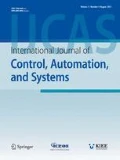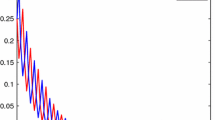Abstract
In this paper, the problem of exponential stabilization for a class of discrete-time complex network with saturated impulse input is investigated. Based on the inductive method, convex analysis, and auxiliary matrix, several Lyapunov-type stability criteria are derived for exponential stability of discrete-time complex network with impulsive input saturation. Two examples are also presented to illustrate the effectiveness and the feasibility of the obtained results.
Similar content being viewed by others
References
D. H. Nguyen, “Minimum-rank dynamic output consensus design for heterogeneous nonlinear multi-agent systems.” IEEE Transactions on Control of Network Systems, vol. 5, no. 1, pp. 105–115. 2018.
X. Wang, H. Su, L. Wang, and X. Wang, “Edge consensus on complex networks: a structural analysis,” International Journal of Control, vol. 90, no. 8, pp. 1584–1596, 2017.
Y. Han and C. Li, “Second-order consensus of discretetime multi-agent systems in directed networks with nonlinear dynamics via impulsive protocols,” Neurocomputing, vol. 286, pp. 51–57, 2018.
J. Liang, Z. Wang, and X. Liu, “Exponential synchronization of stochastic delayed discrete-time complex networks,” Nonlinear Dynamics, vol. 53, no. 1–2, pp. 153–165, 2008.
Z. H. Guan, Z. W. Liu, G. Feng, and Y. W. Wang, “Synchronization of complex dynamical networks with timevarying delays via impulsive distributed control,” IEEE Transactions on Circuits and Systems I: Regular Papers, vol. 57, no. 8, pp. 2182–2195, 2010.
Z. Li, J. A. Fang, Q. Miao, and G. He, “Exponential synchronization of impulsive discrete-time complex networks with time-varying delay,” Neurocomputing, vol. 157, pp. 335–343, 2015.
H. Li, X. Liao, G. Chen, D. J. Hill, Z. Dong, and T. Huang, “Event-triggered asynchronous intermittent communication strategy for synchronization in complex dynamical networks,” Neural Networks, vol. 66, pp. 1–10, 2015.
W. Sun, T. Hu, Z. Chen, S. Chen, and L. Xiao, “Impulsive synchronization of a general nonlinear coupled complex network,” Communications in Nonlinear Science and Numerical Simulation, vol. 16, no. 11, pp. 4501–4507, 2011.
C. Li, W. Yu, and T. Huang, “Impulsive synchronization schemes of stochastic complex networks with switching topology: average time approach,” Neural Networks, vol. 54, no. 6, pp. 85–94, 2014.
Y. Liu, B. Z. Guo, J. H. Park, and S. M. Lee, “Nonfragile exponential synchronization of delayed complex dynamical networks with memory sampled-data control,” IEEE transactions on neural networks and learning systems, vol. 29, no. 1, pp. 118–128, 2018.
Z. Tang, J. H. Park, and W. X. Zheng, “Distributed impulsive synchronization of Lur’e dynamical networks via parameter variation methods,” International Journal of Robust and Nonlinear Control, vol. 28, no. 3, pp. 1001–1015, 2018.
Z. Tang, J. H. Park, Y. Wang, and J. Feng, “Distributed Impulsive Quasi-Synchronization of Lur’e Networks With Proportional Delay,” IEEE tTransactions on Cybernetics, 2018.
Z. Tang, J. H. Park, and J. Feng, “Novel approaches to pin cluster synchronization on complex dynamical networks in Lure forms,” Communications in Nonlinear Science and Numerical Simulation, vol. 57, pp. 422–438, 2018.
Y. Liu, J. H. Park, B. Z. Guo, F. Fang, and F. Zhou, “Eventtriggered dissipative synchronization for Markovian jump neural networks with general transition probabilities,” International Journal of Robust and Nonlinear Control, vol. 28, no. 13, pp. 3893–3908, 2018.
T. Musa, “Complex network security analysis based on attack graph,” Neuropsychologia, vol. 12, no. 1, pp. 131–139, 2015.
Z. Li and G. Chen, “Global synchronization and asymptotic stability of complex dynamical networks,” IEEE Transactions on Circuits and Systems II: Express Briefs, vol. 53, no. 1, pp. 28–33, 2006.
Z. Xiao, B. Cao, J. Sun, and G. Zhou, “Culture of the stability in an eco-industrial system centered on complex network theory,” Journal of Cleaner Production, vol. 113, pp. 730–742, 2016.
W. J. Yuan, X. S. Luo, P. Q. Jiang, B. H. Wang, and J. Q. Fang, “Stability of a complex dynamical network model,” Physica A Statistical Mechanics and Its Applications, vol. 374, no. 1, pp. 478–482, 2007.
Y. Liu, J. H. Park, and F. Fang, “Global exponential stability of delayed neural networks based on a new integral inequality,” IEEE Transactions on Systems, Man, and Cybernetics: Systems, 2018.(in press).
H. Li, C. Li, T. Huang, and W. Zhang, “Fixed-time stabilization of impulsive cohen-grossberg bam neural networks,” Neural Networks, vol. 98, no. 3, pp. 203–211, 2018.
C. Li, S. Wu, G. G. Feng, and X. Liao, “Stabilizing effects of impulses in discrete-time delayed neural networks,” IEEE Transactions on Neural Networks, vol. 22, no. 2, pp. 323–329, 2011.
Z. Yang and D. Xu, “Stability analysis and design of impulsive control systems with time delay,” IEEE Transactions on Automatic Control, vol. 52, no. 8, pp. 1448–1454, 2007.
N. K. Bose and Y. Shi, “Network realizability theory approach to stability of complex polynomials,” IEEE Transactions on Circuits and Systems, vol. 34, no. 2, pp. 216–218, 1987.
D. Nesic and A. R. Teel, “Input-output stability properties of networked control systems,” IEEE Transactions on Automatic Control, vol. 49, no. 10, pp. 1650–1667, 2004.
C. Li and X. Liao, “Impulsive stabilization of dlayed neural networks with and without uncertainty,” International Journal of Robust and Nonlinear Control, vol. 17, no. 16, pp. 1489–1502, 2007.
X. Liu and Z. Zhang, “Uniform asymptotic stability of impulsive discrete systems with time delay,” Nonlinear Analysis: Theory, Methods and Applications, vol. 74, no. 15, pp. 4941–4950, 2011.
Y. Zhang, J. Sun, and G. Feng, “Impulsive control of discrete systems with time delay,” IEEE Transactions on Automatic Control, vol. 54, no. 4, pp. 830–834, 2009.
J. Zhou and Q. Wu, “Exponential stability of impulsive delayed linear differential equations,” IEEE Transactions on Circuits and Systems II Express Briefs, vol. 56, no. 9, pp. 744–748, 2009.
Y. Zhang, “Exponential stability of impulsive discrete systems with time delays,” Applied Mathematics Letters, vol. 25, no. 12, pp. 2290–2297, 2012.
J. Lu, D. W. Ho, and J. Cao, “A unified synchronization criterion for impulsive dynamical networks,” Automatica, vol. 46, no. 7, pp. 1215–1221, 2010.
P. Cheng, F. Deng, and F. Yao, “Almost sure exponential stability and stochastic stabilization of stochastic differential systems with impulsive effects,” Nonlinear Analysis Hybrid Systems, vol. 30, no. 4, pp. 106–117, 2018.
X. Li and S. Song, “Stabilization of delay systems:delaydependent impulsive control,” IEEE Transactions on Automatic Control, vol. 62, no. 1, pp. 406–411, 2016.
X. Li, J. Shen, H. Akca, and R. Rakkiyappan, “Comparison principle for impulsive functionaldifferential equations with infinite delays and applications,” Communications in Nonlinear Science and Numerical Simulation, vol. 57, pp. 309–321, 2018.
Z. G. Li, C. Y. Wen, and Y. C. Soh, “Analysis and design of impulsive control systems,” IEEE Transactions on Automatic Control, vol. 46, no. 6, pp. 894–897, 2001.
Z. Lu, X. Chi, and L. Chen, “Impulsive control strategiesin biological control of pesticide,” Theoretical Population Biology, vol. 64, no. 1, pp. 39–47, 2003.
Y. Li, X. Liao, C. Li, T. Huang, and D. Yang, “Impulsive synchronization and parameter mismatch of the threevariable autocatalator model,” Physics Letters A, vol. 366, no. 1–2, pp. 52–60, 2007.
B. M. Miller and E. Y. Rubinovich, Impulsive Control in Continuous and Discrete-continuous Systems, Springer Science and Business Media, 2012.
J. Sun, Y. Zhang, and Q. Wu, “Less conservative conditions for asymptotic stability of impulsive control systems,” IEEE Transactions on automatic control, vol. 48, no. 5, pp. 829–831, 2003.
M. S. Ali and J. Yogambigai, “Exponential stability of semi-markovian switching complex dynamical networks with mixed time varying delays and impulse control,” Neural Processing Letters, vol. 46, pp. 1–21, 2016.
X. Li, W. H. Chen, W. X. Zheng, and Q. G. Wang, “Instability and unboundedness analysis for impulsive differential systems with applications to lurie control systems,” International Journal of Control Automation and Systems, vol. 16, no. 4, pp. 1521–1531, 2018.
C. Li, Y. Zhou, H. Wang, and T. Huang, “Stability of nonlinear systems with variable-time impulses: b-equivalence method,” International Journal of Control Automation and Systems, vol. 15, no. 5, pp. 2072–2079, 2017.
J. Tan, C. Li, and T. Huang, “Comparison System Method for a class of Stochastic Systems with Variable-time Impulses,” International Journal of Control Automation and Systems, vol. 16, no. 2, pp. 702–708, 2018.
X. Tan, B. Hu, Z. H. Guan, R. Q. Liao, J. W. Xiao, and Y. Huang, “Stability of hybrid impulsive and switching stochastic systems with time-delay,” International Journal of Control Automation and Systems, vol. 16, no. 4, pp. 1532–1540, 2018.
M. J. Hu, Y. W. Wang, and J. W. Xiao, “Positive observer design for linear impulsive positive systems with interval uncertainties and time delay,” International Journal of Control Automation and Systems, vol. 15, no. 3, pp. 1032–1039, 2017.
T. Hu and Z. Lin, Control Systems with Actuator Saturation: Analysis and Design, Springer Science and Business Media, 2001.
L. Li, C. Li, and H. Li, “An analysis and design for timevarying structures dynamical networks via state constraint impulsive control,” International Journal of Control, pp. 1–9, 2018.
L. Li, C. Li, and H. Li, “Fully state constraint impulsive control for non-autonomous delayed nonlinear dynamic systems,” Nonlinear Analysis: Hybrid Systems, vol. 29, pp. 383–394, 2018.
Z. Li, J. A. Fang, T. Huang, Q. Miao, and H. Wang, “Impulsive synchronization of discrete-time networked oscillators with partial input saturation,” Information Sciences, vol. 422, no. 3, pp. 531–541, 2018.
Z. H. Guan, Z. W. Liu, G. Feng, and Y. W. Wang, “Synchronization of complex dynamical networks with timevarying delays via impulsive distributed control,” IEEE Transactions on Circuits and Systems I: Regular Papers, vol. 57, no. 8, pp. 2182–2195, 2010.
J. Cao and L. Wang, “Exponential stability and periodic oscillatory solution in BAM networks with delays,” IEEE Transactions on Neural Networks, vol. 13, no. 2, pp. 457–463, 2002.
Author information
Authors and Affiliations
Corresponding author
Additional information
Recommended by Editor Jessie (Ju H.) Park. This work was supported by the National Natural Science Foundation of China under Grants 61873213 and 61633011, and in part by the Chongqing Research Program of Basic Research and Frontier Technology of cstc2015jcyjBX0052.
Keyu Chen received the B.S. degree in Electrical Engineering from North China institute of Science & Technology in 2017. He is currently pursuing towards the M.S. degree with College of Electronic and Information Engineering, Southwest University, Chongqing, China. His research interests include nonlinear control systems, the stability of dynamical systems, and complex networks.
Chuangdong Li received his B.S. degree in Applied Mathematics from Sichuan University, Chengdu, China in 1992, and an M.S. degree in operational research and control theory and a Ph.D. degree in Computer Software and Theory from Chongqing University, Chongqing, China, in 2001 and in 2005, respectively. He has been a Professor at the College of Electronic and Information Engineering, Southwest University, Chongqing 400715, China, since 2012, and been the IEEE Senior member since 2010. From November 2006 to November 2008, he serves as a research fellow in the Department of Manufacturing Engineering and Engineering Management, City University of Hong Kong, Hong Kong, China. He has published about more than 100 journal papers. His current research interest covers computational intelligence, neural networks, memristive systems, chaos control and synchronization, and impulsive dynamical systems.
Liangliang Li received the B.S. Degree in Hefei Normal University, Hefei, China, in 2012 and his M.S. degree in Mathematics from China Three Gorges University, Yichang, China, in 2015. Currently, he is working towards the Ph.D. degree at the College of Electronic and Information Engineering, Southwest University, Chongqing, China. His current research interests include stability of dynamical systems, nonlinear control systems, and neural networks.
Rights and permissions
About this article
Cite this article
Chen, K., Li, C. & Li, L. Locally Exponential Stability of Discrete-time Complex Networks with Impulsive Input Saturation. Int. J. Control Autom. Syst. 17, 948–956 (2019). https://doi.org/10.1007/s12555-018-0608-6
Received:
Revised:
Accepted:
Published:
Issue Date:
DOI: https://doi.org/10.1007/s12555-018-0608-6




